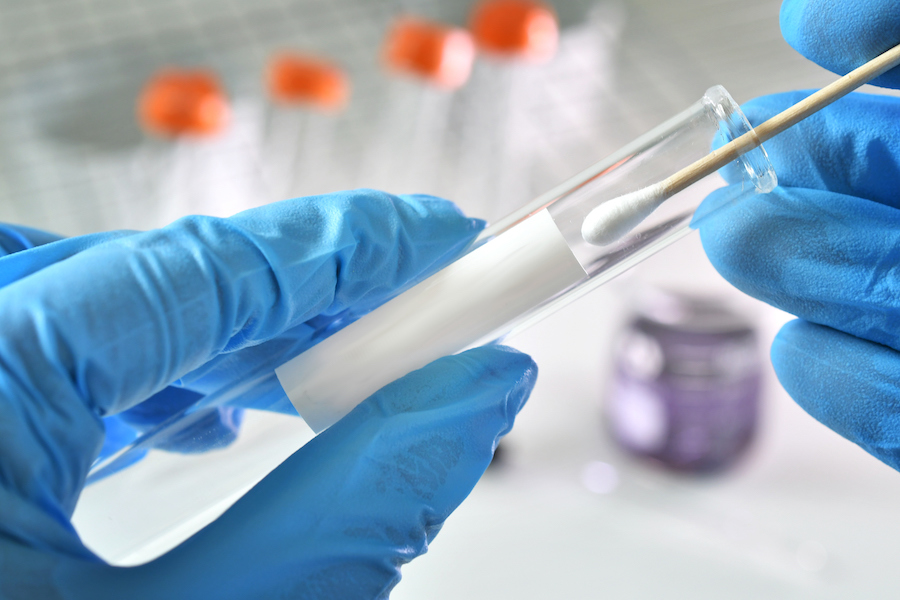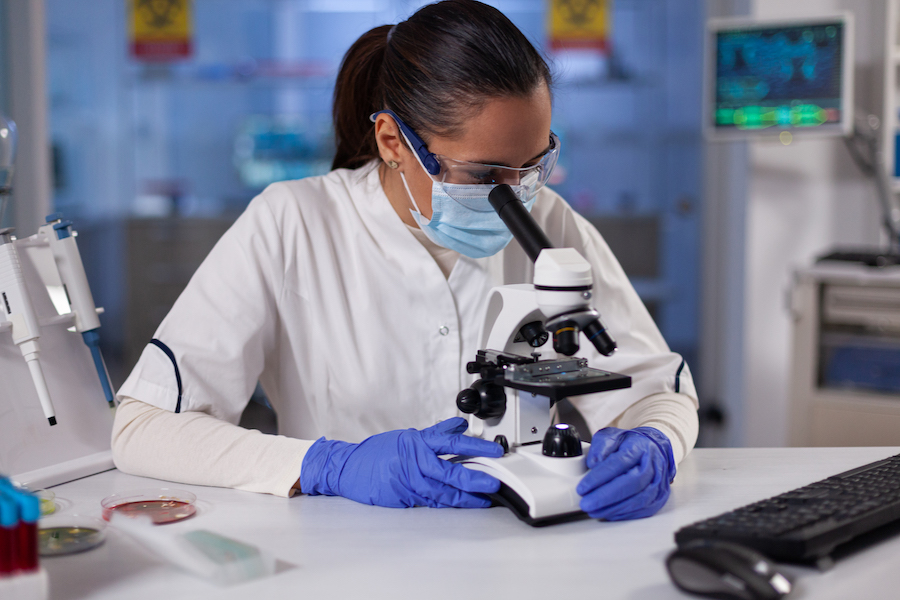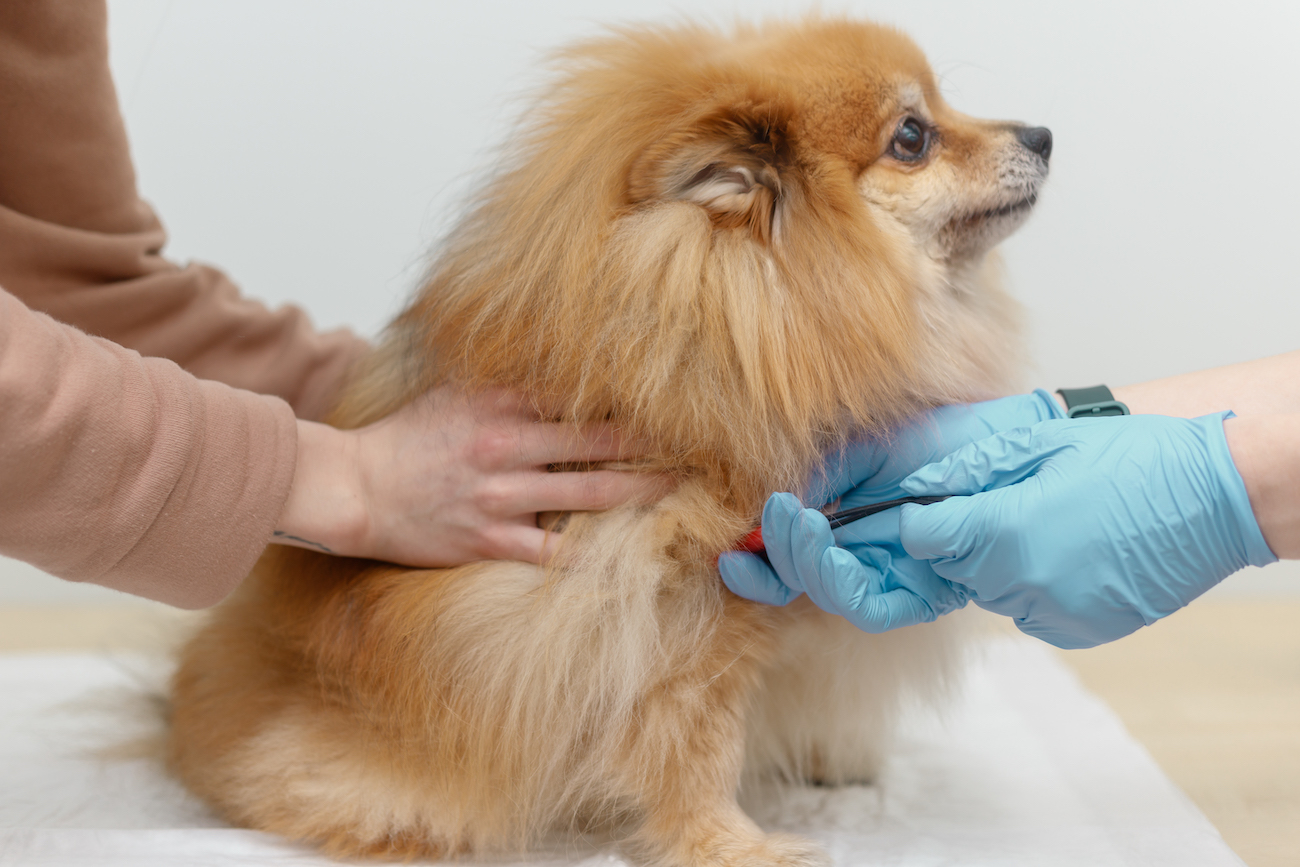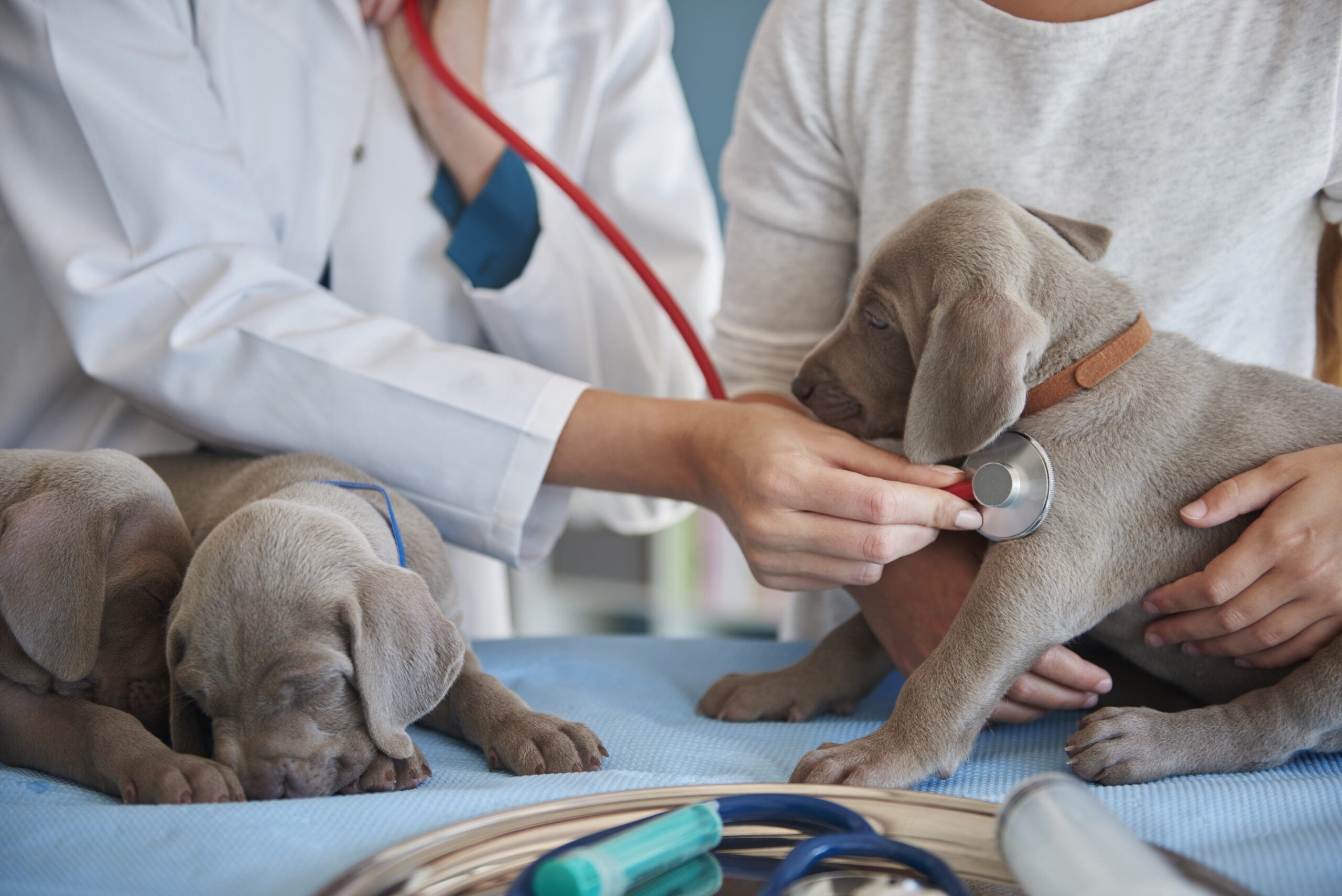
Myth Buster: Crate
Myth Buster Popular Myth: Crate training is unnecessary and dogs hate crates. Wrong again! Crate training can be simple and fun, and your dog may
Dr Robert Westra, from Neogen, home of Paw Print Genetics, has taken the time to sit down and answer some questions about the company, their mission, how it began, and much more. With all the buzz right now about genetic testing, we feel like it’s important to choose a reputable company that offers high quality and a great experience.
The Dog Journal: Robert, thank you for joining us. I’ve heard you talk a lot about genetic testing, how it works, why it works, etc. Today I would like to dive into Paw Print Genetics in specific. Let’s talk about the company, your creditability, why you do what you do, and what makes you stand out from the other DNA and genetic testing companies out there. I’m excited to begin, so let’s get started! First off, can you tell me a bit more about yourself, and where you originated from?
Dr. Robert Westra: Yes, my name is Dr. Robert Westra. I’m a veterinarian and graduated from vet school in Washington State University in 2008. I come from a background of wildlife, where I studied the loss of genetic diversity in endangered species. As the population of any endangered species become smaller, we lose genetic diversity within that species. And so, my role was to see how that affects the survivability and health of that particular species, as the genetic pool becomes smaller and smaller. So that’s my introduction into genetics.
My veterinary career took a more traditional approach, where I was in small animal practice with the focus of emergency medicine. I guess my honest reason for this is I had attached myself to my wife’s success and she had a very defined career, so I ended up working as well so she could continue with her education and credentials. She actually ended up starting with PPG in 2012, right at the onset of the company. As that was happening, though, I continued my veterinarian and emergency medicine career.
In 2020, a position became available within PPG that they thought was a good fit for my career, so I basically put to rest my medical career and became involved in animal genetics. At the end of 2021, PPG was acquired by Neogen. Neogen is the largest animal genetics company in the world and they have laboratories stretching all the way from Canada to Asia. Their domestic laboratory is located in Lincoln, Nebraska, and they acquired PPG because they were primarily in the food safety business, and they wanted
to expand into companion animal practices, so rather than reinvent the wheel, they acquired us as their companion animal branch.
TDJ: When did PPG originally begin, and how long have they been in business?
DRW: So, the company was started and operated exclusively by a woman named Lisa Schaffer. She is a human geneticist who does human medical genetic testing. One thing she became aware of was the lack of oversight and regulations within the canine genetic industry, so she and a few others, my wife included, got together and decided to start PPG with the idea that they would bring the same quality and control within the human medical genetic industry to the canine side of things.
TDJ: Is there a lot of other similar companies out there doing genetic testing but with lower standards?
DRW: I would say it a little different. Because of the lack of oversight and regulations, there are lots of companies out there that can basically process their data anyway they would like to process it. So yes, I could be high-handed and say we are special because we adhere to such strict high-level standards. To answer your question, there are a lot of companies out there and as I tell people as I’m giving presentations, you haveto be critical of how they process the information, because if they don’t have the same quality control, the results becoming questionable. And really, the true usefulness of genetic testing is you have to have confidence in the results, because you’re making decisions that impact your breeding program for generations to come.
TDJ: So, Robert, can you dumb down genetic testing for a bit, and in simple terms tell me how it actually works?
DRW: The high-level overview of how it works is basically this. First, we have to collect a sample that contains DNA. That can either be done through blood, tissue, or any kind of biological material containing DNA. Blood was the old gold standard, but with the way technology has gone we’ve been able to swap the cheek with a regular cheek swab, and we’re actually able to collect enough cells just on the inside of the cheek to properly process the complete story.


After the samples are collected, we need to extract the DNA from the cells, and we do that through a purification process, where basically we get rid of every part of the cell that doesn’t include genetic material. We get rid of the cell walls, the cell organs, and everything that’s not part of the DNA, and this process takes the raw biological material all the way to pure DNA. Now, once we have this pure DNA we can’t go straight to testing, first we need to go through what we call an amplification process. Basically, what this does is it takes the DNA we collectedand effectively copies it tens of thousands of times. The reason we need to do this is when we want to assess this DNA, it’s so much easier to look at if the files are really big, versus if we are looking at a fractional percentage of that. After the amplification process that’s when the magic begins to happen, where we u se a n umber o f technologies available to basically break the code within the DNA.
TDJ: Robert, if I’m a breeder, and I get my dogs genetically tested, and they test clear of any genetic diseases, does that mean they are automatically good breeding stock?
DRW: Excellent question! Something to think about in regards to genetic testing is it’s still in its infancy, in terms of what we know and understand. Maybe at some point down the road we’ll be able to use genetic testing to find out everything we need to know about that dog, but we’re not there yet. I often say genetic testing is just one part of the evaluation you need to do to decide whether the dog or puppy in question is potentially good breeding stock. You as the breeder still have a lot of understanding and experience as far as traits, behavior, and so forth. You’re the one that has to be evaluating that and making decisions. When you look at the complete picture, the genetics, the hip and heart history, behavior, intelligence, traits, and you use wisdom in breeding, the likelihood of producing another good dog or puppy is high.
TDJ: What is the most common myth that you run into as a vet regarding genetic testing?
DRW: One of the most common myths I run into is that blood is better than saliva, which is not true. That was the case in years prior, but with the advancement of technology this is a very accurate way of testing today. Like I mentioned above, another thing to be clear on is that genetic testing is only a part of your breeding program, not the complete story. Just because you have genetically cleared your dogs does not give you a free pass, and does not mean that you shouldn’t do hip and heart testing etc.

TDJ: What is your current role within Paw Print Genetics?
DRW: Right now I wear multiple hats, but my primary job is customer education and outreach, and I travel around the country meeting new people, doing presentations, and making sure people understand the way genetic testing works. Really, I’m doing my job by talking to you. Because the idea is we want people to understand the value of genetic testing, and almost as important, how to understand the results. People think “I need to do genetic testing” and then when they get the results back, they have no idea how to process the information or how to apply it to their breeding program. So that’s my number one role.
At the same time, I have clinical responsibilities, so I’m the one checking every test that goes out just to make sure everything is consistent and has not undergone any errors. You will see my name at the bottom of the reports, because I’ve reviewed the data and made sure that everything looks accurate and is compliant with what we expect.
Within the bigger picture of the company, they are also taking advantage of the fact that I understand genetic testing at almost every level, so they include me in more of the corporate meetings to talk about big picture decisions, how to improve genetic testing, create new products, etc. I come from a family of educators, so I enjoy educating and teaching.
TDJ: So, what’s the process for me as a breeder to genetically test my dogs?
DRW: Well, first of all, you need to decide what you’re looking to test for. If you’re looking for disease traits, you really only need to test for the common diseases within that specific breed. There are companies out there, ourselves included, that will actually do what we call genetic screening, where they take and test for every genetic disorder possible. That’s fantastic, and here in the United States were often under the impression that more is better, but that’s not really how it works in the genetic industry. If you’re dealing with purebred dogs, you only really need to test for the diseases that are known for that specific breed.
Now let’s say you’re a doodle breeder and you want to get the perfect traits, colors, and want to be free of any disease mutations, you may be better off going with that complete screening product. That test might be a better option because you want more extensive information.
After you decide which test you’re looking for, it’s a simple ordering process, either online or over the phone. The kit comes pre-labeled for the dog you want to test, so you basically swab the inside of the cheek with the cheek swab, put the kit back together, and send it back to us. If we exclude the time it takes to ship the kits back and forth, we can get you your results within 10 to 14 days.
TDJ: Dr, on paper, we as breeders should actually be able to literally eliminate certain genetic disorders through careful testing and breeding. Does is actually work that way in real life?
DRW: Yes, this actually very much happens. We just had this happen overseas in a wirehaired breed that was susceptible to this one mutation, where within three years after doing rigorous testing and careful breeding, they were able to literally exterminate that disease mutation. And so yes, it really does make an impact, and through careful testing and breeding you can actually improve the breed.
TDJ: Do you have any kind of outreach program for the people that are buying our puppies?
DRW: We do work from both ends, because honestly, there’s a number of breeders out there, that won’t integrate something like this into their breeding program if their potential buyers aren’t asking for it. Ideally, it would work the other way, to where a breeder continues to want to improve his breeding program. But often times there needs to be a demand for improvement before it will happen. We educate consumers through social media, as that’s just the way the world works these days. The other thing we do for consumers is we work with a lot of organizations that evaluate breeders, like the Good Dog Organization, and the Canine Care Certified program established by Purdue University.
TDJ: Any up-and-coming exciting new projects or programs for PPG?
DRW: Absolutely, I’ll let you take a peek behind the curtain. As of right now were actually trying to simplify our result report. We want it to be more functional for the breeders and we don’t want to have them to go through 16 pages of data. They need to be able to look at the data quickly and say yes, that’s what I wanted to know. So were actively working on simplifying the reporting system, which I’m very excited about. Also, there are many new tests being developed every year as the researchers and scientists discover new mutations, and so we literally develop new tests every year. We just developed a test for a late onset neurological disease that affects the nervous system in a bunch of different dogs. We are very excited about this, because there are a lot of dogs that are impacted by this disease mutation, and the test prior to this for that condition was very complicated and confusing, and nonfunctional for the day-to-day breeder.
TDJ: And would you say your business and demand for your tests are growing?
DRW: Yes, because the demand for genetically healthy puppies is growing and as it becomes easier to understand, more people will step up on the breeding side and say “hey I can use this to make my program better” On the client side of things, especially with the cost of puppies, they’re going to continue to want to do everything they can to improve the chances of years of happy camaraderie. Because of that shift in the industry, genetic testing is definitely benefiting.
TDJ: Any final words of wisdom you would like to share with our readers?
DRW: Sure, I’ll finish with two points. The client has a lot of choices about which genetic testing company they go with, and I would tell them to go with the one with which they have the most confidence in the results. And number two, we are here as a resource at any time. You can pick up the phone and talk to any one of us. We started with the idea that education was paramount to genetic testing, and I want your readers to understand that if they have questions about this they have someone to go to. No questions are dumb questions.
I want to see PPG be a valuable part of every quality breeding program out there!

Myth Buster Popular Myth: Crate training is unnecessary and dogs hate crates. Wrong again! Crate training can be simple and fun, and your dog may

Today, there’s not a much scarier news headline than a “mystery illness.” You may have seen a similar story about respiratory disease in dogs the past few months. The hype has calmed down, but there’s still a lot unknown about what happened. As we learned with COVID-19, claims of a mysterious new illness should not be taken lightly. But thankfully, not every news headline becomes a global pandemic, either. Here are some things to know about the “mysterious” canine respiratory disease.

The Dog Journal The Right Fit: Hungarian Vizsla Many dog lovers around the world are used to hearing about common dog breeds such as Retrievers,